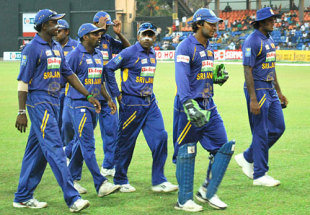We've got to keep working on our fielding - Bayliss
Trevor Bayliss has responded to chief selector Asantha de Mel's criticisms on the team's poor fielding
Sa'adi Thawfeeq
14-Feb-2009

| ||
Trevor Bayliss, the Sri Lanka coach, has responded to chief selector Asantha de Mel's criticism on the team's poor fielding by saying that while the most of the players are not outstanding fielders, they will continue to work hard on that aspect of their game.
"A lot of them probably know they are never going be a Jonty Rhodes but we've just got to keep working hard," Bayliss said before the team's departure for the two Tests in Pakistan. "We've also got a couple of very good fielders in [Tillakaratne] Dilshan and [Chamara] Kapugedera. It's one of those things where we've got to keep working on the players as best as we possibly can."
After Sri Lanka's four successive ODI losses to India earlier this month, with dropped catches prominently featuring in the first three, de Mel said he had observed the team was not doing enough fielding drills. However, Bayliss said the criticisms emerged only after a few defeats for the team. "All the talk of our fielding came after we fielded badly in one or two games. That type of thing can happen. There was no concern about the fielding when we won seven of the last eight series."
Bayliss said the right attitude was important in becoming a good fielding unit. "In the fifth game [against India] we fielded quite well. We took in a lot better attitude to the field. We wanted the ball to come to you and that showed in the enthusiasm of the boys out in the middle. Everyone was confident going at the ball. You can't go from a good fielding team to a poor fielding team and back again if you haven't got the skills. It's more to do with the pressure the opposition puts you under which obviously makes it difficult. For example if there is movement in the field when a batter looks up after he's hit the ball, I think you can stop a lot of runs.
"Here [in the fifth ODI] we batted first session and we were the ones ahead with over 300 on the board. It is the pressure that the opposition's batting that can put you under sometimes. Everyone tries to have more good days than bad days. We had a couple of games in a row where we didn't have the best time in the field but that's what happens in cricket when you are under pressure. This might be the last time it happens. We are working hard enough so that it doesn't happen very often at all."
Bayliss said the hectic international schedule was a reason for Sri Lanka's slump in fielding standards. "The first game in Pakistan that we played and in the one at Dambulla [the first ODI against India] we looked jaded. The boys don't use that as an excuse. As national cricketers they've got to get on with it and do it."
The behind-the-scenes work on improving the team's fielding was shared, Bayliss said, between him and assistant coach Paul Farbrace. "Paul does more of the technique and the batting skills and we both do a lot of the fielding especially on tours. At home we get some help from Manoj, the SLC [Sri Lanka Cricket] fielding coach. It's really a combined effort right across the board."
Bayliss said the players had to concentrate on little things like watching the ball come to them on the field in order to be consistently good. "It is not just fielding or running between the wickets and bowling. It's playing the right way in certain games situations, what needs to be done at a certain time and play in that manner. Calling an early call and not turning blind and sliding the bat those are things that we need to improve on. The guys can field when they put their mind to it as we saw in the fifth game."
Sri Lanka will play two Tests, between February 21 and March 5, in Karachi and Lahore.